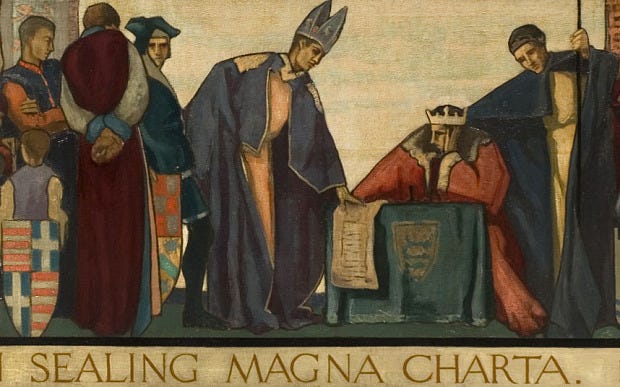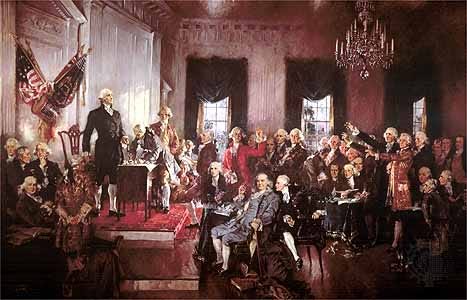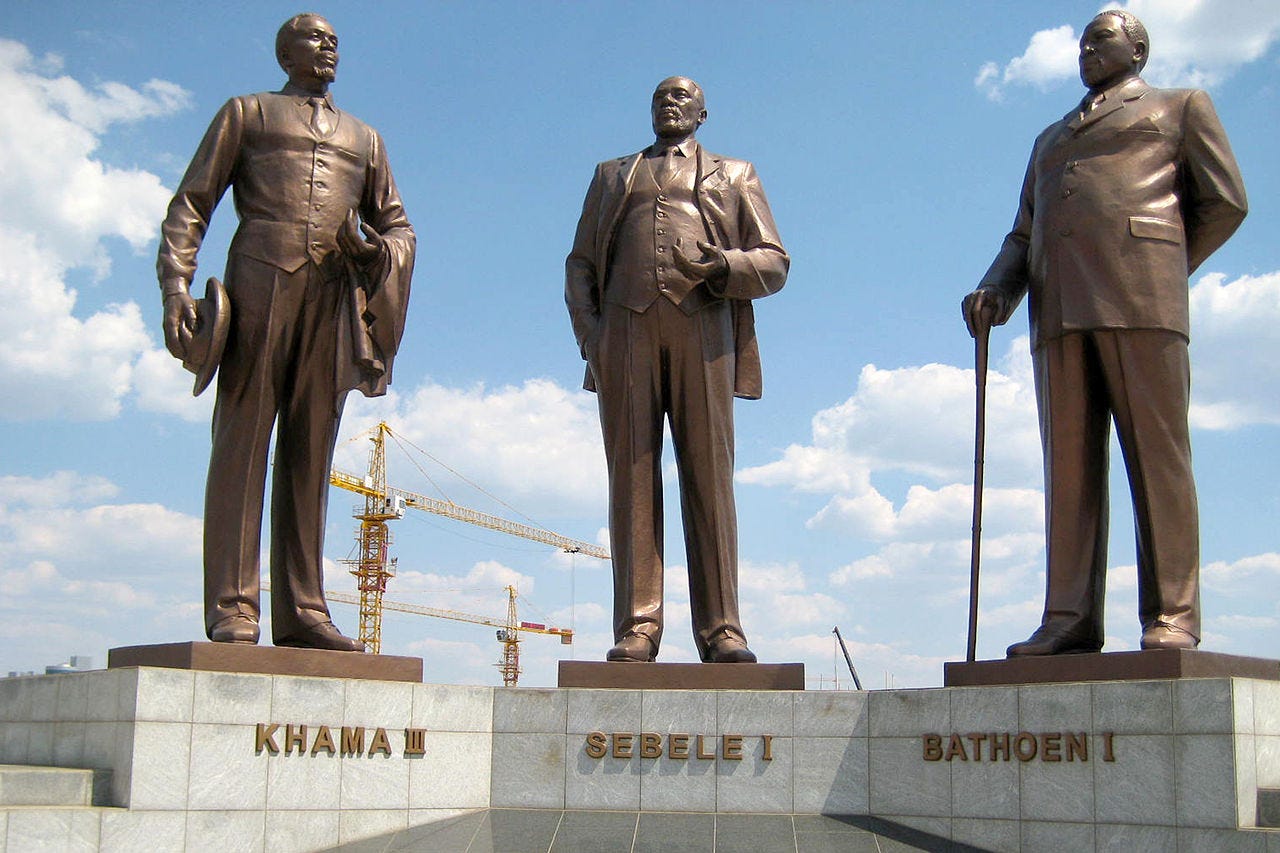The Rise of Modern Democracy
Before England’s constitutional monarchy, the Parliament of England was a simple advisory council to the king. England’s constitutional monarchy began with the famous Magna Carta in 1215 when, among other things, the Parliament gained veto power on the king levying taxes. Look how unhappy King John looks up there, aww.
The relatively inclusive institutions held over from the era of the Roman Republic certainly helped create an environment where the king could be questioned, albeit only by the elites.[13]
Over the next 500 years, the Parliament’s powers were gradually increased and the powers of the king were further limited, despite various confrontations between kings and Parliament. Not only did the nobles gradually increase their representation in government, but the commoners also increased their political power – especially after the Black Plague shifted the balance of power by making the labor of surviving peasants more valuable. Eventually in 1341, the House of Commons was formed, sitting knights and burgesses as a lower house to the House of Lords, which sat clergy and nobility. Yet the proportion of people entitled to vote remained small (less than 3%).[18]
In 1603, Scotland and England joined together in a loose federation. Numerous limits on the monarch were passed in the 1600s and the battles of the English Civil War in the mid 1600s reaffirmed and strengthened the power of parliament. In 1707, the federation of Scotland and England was strengthened in the Treaty of Union that created the nation of Great Britain, and a short time of peace followed. The Reform Acts then expanded suffrage to about 7% of the population in 1832, 20% in 1867, 30% in 1884, and eventually the Reform Act of 1918 and 1928 gave all citizens over 21 the right to vote, including women.[18]
The increasing levels of political representation went hand in hand with the fade of English feudalism and steady economic growth[19] until the Industrial Revolution when growth skyrocketed, creating unprecedented levels of wealth and prosperity. By now predictably, the steady wealth created in medieval England and the wealth created by the industrial revolution each lead to empire building – the “second” English empire being the largest empire in history before it was brought down a few pegs by the First and Second World Wars. The slow fall of the British Empire left some newly independent nations with representative republics, some with oligarchies, and some with outright dictatorships. Many of the earlier ones left with Republics and became some of the riches nations in the world, while ones left with oligarchies or monarchies didn’t do quite so well.
The UK has evolved into a government with a large number of leaders, wide representation, but no clearly separate branches of government (the supreme court has far less power in the UK than in the US for example), and few limitations to what the government can do. Because of the lack of formal governmental limitations, the UK’s government has grown and become synonymous with Big Brother style government.
In contrast with previous nations with representative features, the UK has managed to retain its representative and inclusive institutions and remains among the top 3 wealthiest (assets/capita) and top 15 most productive (GDP/hour-worked) countries to this day.
Before the United states existed, representation in the North American British colonies was already uniquely high. The abundance of land meant that 50-75% of the adult male population could own land, and therefore vote, in the 1720s. This was approximately 30% of the total adult population, whereas in England the percentage was about 1/5 of that. Among the controversies with Britain shortly before the American Revolutionary War was a demand by radicals for universal male suffrage. By 1776, between 35% and 45% of the adult population could vote in many states in the new Union.[20]
As with the previous cases, the republic of the United States was founded in the wake of political upheaval, which in this case culminated in the American Revolutionary War. The United States of America was formally founded as a weakly-coupled federation of the 13 former colonies under the Articles of Confederation in late 1777 (tho not fully ratified until 1781). The Articles established freedom of movement between the states, gave each state a single vote in congress, gave the federal government the sole power to declare war and conduct foreign relations, and required states to keep a militia. In the Articles it was agreed that the constitution may be changed only through approval of congress and ratification by every state.
But the Articles of Confederation are widely agreed to have been a failure. The government formed by the Articles had only one branch, congress, which the president was the head of (like the vice president today). There was no executive office to enforce the laws. There was no central court to have the final say in disputes about federal law, and so state courts could strike down any law they didn’t like.[21] Since the smallest state had as much representation as the largest state in congress, states with large populations quickly became dissatisfied that votes by a minority of the population could create binding law. The central government couldn’t collect taxes from the people, only from the state governments themselves, and states often refused to fulfill tax and other obligations in full. The confederation government had difficulties in every category from foreign affairs to mediating disputes between states. A revision was proposed in 1786, but couldn’t achieve the unanimous support of the states that was necessary.
When the US Constitution was ratified in 1788, it strengthened the union by creating a federal republic with three branches, a bicameral congress, and a more powerful (but still limited) government that had the power to collect taxes from individuals, raise an army, coin money, enforce the law with an armed militia, and regulate commerce among states and with foreign nations. The powerful executive office of President was one of the three branches, and is (to this day) elected indirectly by the people via the Electoral College. In 1791, the first 10 amendments to the constitution listed various limitations of government known as the Bill of Rights. By 1850, property requirements for voting were removed, making white male suffrage almost universal.
Tensions rose in the years leading up to the American Civil War. In 1860, about 12% of the population were slaves, 90% of whom were in the southern states that would secede to form the confederacy. 40% of the people in those southern states were slaves, in some towns the proportion was as high as 95%.[22] The South had stagnated economically in comparison the to the North. It had a marked lack of development of every kind. Ralph Emerson wrote:
“Slavery is no scholar, no improver; it does not love the whistle of the railroad; it does not love the newspaper, the mail-bag, a college, a book .. it does not increase the white population; it does not improve the soil; everything goes to decay.”[23] – Ralph Emerson
Indeed, illiteracy among white adults was 20 times as high in southern states as in northern ones, 1/3rd the railroad tracks had been laid,[24] and the white population was growing at a far slower rate. Inequality between free men also rose steadily and the number of whites that owned slaves decreased significantly even as the slave population increased.[23] Some argue that the economic troubles of the south was due to poorer soil, however the costly economic inefficiencies of slavery are indisputable. A man is more productive when he can reap the benefits of the product of his labor.
The population stagnation in the south also meant that their power in the federal government was decreasing. Despite this, the southern democrats still had enough power to repeatedly block homestead acts, so as to keep farming competition limited and to prevent the creation of anti-slavery states.
All the northern states had already abolished slavery by 1804 and by 1860 were advocating abolishing it nationwide. Lincoln was one of those advocates, and his election was the catalyst to southern secession and the beginning of the civil war.
After the civil war in 1869, the constitution prohibited denying suffrage based on race, tho significant social pressures continued to circumvent that mandate. In 1913, senators began to be elected directly by the people. In 1920, women gained the right to vote. And in the 1960s civil rights further strengthened suffrage.
Alongside the unprecedented representative increases and government limitations, the economy of the United States, and the thirteen British colonies they came from, grew quickly from their inception through the current day with only a few relatively small blips in times of war or depression.[25] The US has been the largest economy since the late 1800s, and at the time of this writing, is the 2nd wealthiest country (assets/capita) and in the top 5 most productive countries (GDP/hour-worked).
Botswana is another fascinating story of the success of genuine representation. In 1885, the cheifs Khama III, Bathoen, and Sebele I appealed to the British for assistance against hostilities with neighboring tribes and the Dutch Boers. The British accommodated what was then known as Bechuanaland, splitting them into a British protectorate north of the Molopo River and a colony south of it.
Ten years later, the same three leaders foresaw an impending authoritarian takeover of their country by the mining magnate Cecil Rhodes. Most British politicians didn’t think Bechuanaland was worth colonizing, but Rhodes pushed hard for Bechuanaland to be given to the British South African Company (BSAC). Khama III had converted to Christianity and also imposed it on his people. During a visit in 1895, Khama III made much of his Christian pursuits and convinced the British to deny BSAC control of Bechuanaland and retain its status as a British protectorate. This ruined Cecil Rhodes’ reputation and thwarted the impending exploitative regime. Rhodes famously commented: “It is humiliating to be utterly beaten by these niggers.“
Khama, Bathoen, and Sebele and their successors then systematically discouraged British developments, like railroads and mining prospecting, until they were able to successfully muster broad support for democratic independence in 1969. After decades of under-development both from British disinterest and intentional barriers to development, Botswana was one of the poorest nations in Africa, and the world.
But after independence, rapid support for inclusive political institutions and free enterprise without fear of British control (or other authoritarian control) ushered in explosive economic growth that quickly made Botswana one of the richest and most inclusive countries in Africa.
In the late 1969, Botswana had a GDP/capita of about $70/year and in 2015 that number has grown to almost $19,000/year. The are still growing more than twice as fast as the US and UK at an average of over 5% per year.
By the People
At its core, it should be fairly clear why increases in representation and moves toward democracy lead to powerful and wealthy states when thought in context of improving cooperation. As humans naturally look out for the interests of themselves, their family, and their friends, clashes of interest can lead to destructive competition of various magnitudes from theft of an apple to murder of the king’s family. Any move that eliminates this kind of destructive behavior or improves the ability for people to cooperate, naturally reduces costs (in terms of both money and lives) and increases people’s ability to create. Seen from this light, it’s clear why consistent and fair rule of law is important in fostering cooperation, and therefore prosperity.
The Greek historian Polybius developed a theory of cyclical government where governments would cycle between monarchy, aristocracy, and democracy, with a period of degeneracy (tyranny, oligarchy, or mob rule) after each phase. He advocated a government that mixed all three types in order to stop the cycle that he (as well as philosophers like Aristotle and Plato) saw as harmful. Polybius lived at the end of the golden age of the Roman Republic, and saw the it as an embodiment of this philosophy. He thought its mixed government was the reason for its staying power. Ironically, the Roman Republic suffered the same mob rule and then monarchy he described in his Histories. Still, his theory of a mixed government was the beginning of a theory of separation of powers.
In reviewing the history of pre-modern democracies from the a previous article, it certainly seems like there is a pattern of devolution. Sparta’s wider oligarchy eventually narrowed substantially before being conquered. The Roman Kingdom devolved into a tyranny, creating the Republic, which started oligarchical, became more representative, devolved into an oligarchy again (something Polybius would have called mob rule), and then switched back into a monarchy. The various bastions of democracy were almost exclusively oligarchies of varying representativeness. We can only guess that Athens would have suffered the same fate had it not been conquered.
But modern democracies are much more of a mixed government than those early democracies. Real representative modern democracies may not suffer the same fate as Rome and Sparta, or may at least be far longer lasting, because of the modern constitution. The modern constitution requires much more agreement to be changed, where not much more than a simple majority was required in all those early democracies. However, its not out of the question that our governments might consolidate power to such a degree that they fall to the same fate, if we let them.
Empire And Federation
Another angle I want to come from is how larger nations are formed. Most nations in the past have been formed by one government dominating another government. The sometimes tense times of peace that were brokered (from such interactions as the ones that created the Mongol empire) always lead most immediately to oligarchies. When one group threatens or demonstrates violence against another group, no kind of democracy can come of that without a revolution.
A federation, on the other hand, incubates a much more comfortable peace that fosters far more cooperation. Several ancient Greek leagues, for example the Aetolian and Achaean leagues, were federations that banded together and became forces to be reckoned with, despite the cities involved being mostly nothing special in the area. Thinking themselves superior, Sparta and Athens refused joining leagues like these and fell to larger coalitions because of it.
In contrast to empires, federations are voluntary unions of governments. Some modern nations like Germany and the United States were originally formed as federations. The European Union is also a federation, as is the pre-columbian Iroquois Nation.
The power of a federation can also be seen in pseudo-federal nations like the Persian Empire that existed around the same time as the Athenian republic. Its tolerant atmosphere lead to leaving the power structure of subjugate states intact. That plus its marked lack of slavery made it pretty darn successful and well liked by its people, despite being an autocratic empire.
In essence, the states of a federation act as a separation of power from the federal government. The states that make up the federation usually retain significant power and autonomy, allowing them to protect the interests of their own population.
Conclusion
The past was dominated by oligarchies and empires. The few were in control of the many, leading to widespread and chronic poverty that lasts to this day in most of the world. There have been only a handful of cases where a government represents a large fractions of its people. The point I’m driving at in describing these historical governments, in this and previous articles, is that these cases have been by far the most successful as evidenced by the fact that every state with a recorded history of significant increases in representation became wealthy and powerful.
Some of those who have forgotten the examples of the Spanish empire, Nazi Germany, and the USSR say that China’s oligarchical rule may be some kind of new magically effective form of government. These advocates fail to see that the people’s lack of political power will ultimately drive China to stagnate while the elites maneuver the nation’s policies to their favor. In recent years it’s become clear that China has indeed been stagnating, as its GDP growth has fallen steadily since 2007.
The future of government must be in the realm of democracy, federation, and decentralization. Governments bound by voluntary treaties rooted in popular agreement, and further limitations of government with greater powers to the people. I’ll touch on how much agreement is best in later posts (hint, its usually more than a majority).
There is probably truth to cycles in government between concentrated power (monarchies) and more spread out power (oligarchies), but like Polybius, I believe government can be structured in such a way to slow the cycle and minimize how concentrated power can become in that cycle. While separation of powers is one important mechanism for that, perhaps a more important one is government limitations – something ancient governments almost entirely lacked.
In a future post, I’ll be talking about the proper role of government and what its limitations should be.
References
Note: The numbers aren’t consecutive because some references are from the previous post, which originally contained this content.
18. Getting the vote – nationalarchives.gov.uk
19. http://www.lse.ac.uk/economicHistory/pdf/Broadberry/BritishGDPLongRun16a.pdf
20. The Right to Vote and the Rise of Democracy, 1787-1828 by Donald Ratcliffe
21. http://www.ucs.louisiana.edu/~ras2777/amgov/artsofconfedproblems.html
22. http://www.civil-war.net/pages/1860_census.html
23. http://www.digitalhistory.uh.edu/disp_textbook.cfm?smtID=2&psid=3558







